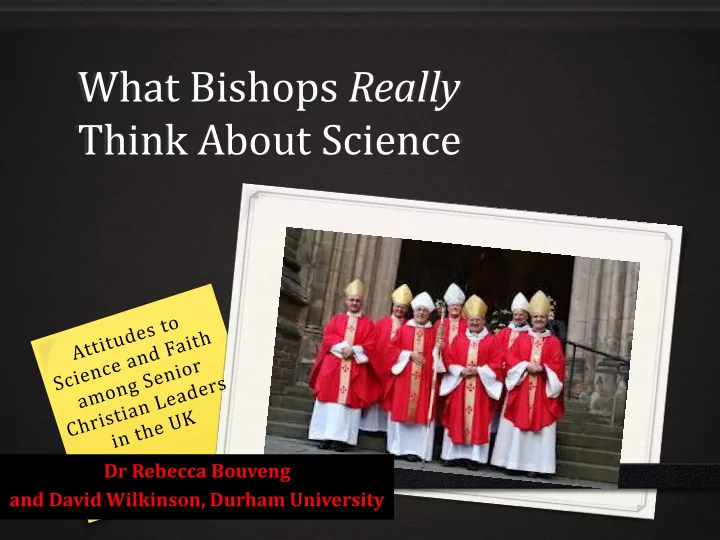

What Bishops Really Think About Science Dr Rebecca Bouveng and David Wilkinson, Durham University
Ecklund’s Study Science vs. Religion : What Scientists Really Think “In fact, for the majority of the scientists I interviewed, it is not the engagement with science itself that leads them away from religion. Rather, their reasons for unbelief mirror the circumstances in which other Americans find themselves: they were not raised in a religious home; they have had bad experiences with religion; they disapprove of God or see God as too changeable .” (Elaine Howard Ecklund, 2010)
The Interview Sample Interviews took place March-June 2013. 30 senior leaders were approached 15 accepted, 1 cancellation. Final sample of 14 senior Christian leaders 13 male, 1 female 7 Anglican Bishops 1 senior charismatic Anglican and parachurch leader 2 senior Methodist leaders 2 senior Pentecostal leaders (1 Bishop, 1 educator) 2 senior Evangelical leaders of parachurch movements
What are the attitudes of UK Christian Leaders to Science? Initial results: 1. Science seen as positive across the interviews and interest in cutting edge science 2. D istinction made between ‘good science’ and ‘bad science’ 3. Rejection of conflict model of science and religion and fundamentalism - negative impact of conflict model and ‘scientism’ 4. Key question for engagement: ‘What does it mean to be human?’ 5. Avoidance strategy – how/why distinction
‘Good Science vs. Bad Science’ “So my view on certain scientists is not as positive as my view on it generally.” (Evangelical National leader) “I don't view science as the enemy of my own faith in God. I view the way in which some people treat science in a rather stark way as being a rather poor tool for anybody talking about anything .” (Senior Methodist leader)
UK Bishops and Christian Leaders See Science in Positive Terms For 12 out of 14 interviewees, science had only, or almost only, positive connotations. “I am a person who rejoices in so much that science produces, particularly medical science, particularly technology, and therefore people's lives have been improved and lives have been saved and health has been improved and lifestyle has been heightened because of a ready acceptance of the advances of science. It seems to me churlish for Christians not to rejoice in that” (Senior Methodist leader)
‘Bad Science’ Fundamentalist Ideological – ‘scientism’ Driven by economic imperatives Intellectually arrogant, does not recognise its own limits Materialist and reductionist ‘Wooden hand of easy empiricism’ Defined in opposition to faith
‘Good Science’ Humble, understands its provisionality Open enquiry and wonderment Open to unanswerable questions Driven by ‘childlike curiosity and wonder’ Resonates with theology Part of holistic worldview
Science vs. Religion: On the Conflict Model “I get irritated by science and faith always being put in contradiction with one another.” (Anglican Bishop)
Science vs. Religion: Effects of the Conflict Model “It’s like an acid rain wearing away the confidence of Christians.” (Anglican Bishop) “What I sense with quite a lot of our clergy…is that they're rather frightened of the subject because of the Dawkins antagonism…they feel they're treading in very dangerous territory – that they'll be shown up for not knowing enough about it, they think they're inexpert… [they] begin to be even more frightened of science because they see it as something that's antagonistic to faith .” (Anglican Bishop)
Key Theme: Where Science Meets Humanity Scientific advances and the question of what it means to be human – AI, genetic engineering
The how/why distinction The ‘move’ to independence Coping strategy for the demands of media, new atheism and fellow Christians
Recommend
More recommend